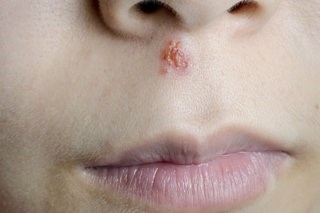A cold sore is a blister that appears on the face – usually around the mouth. They are caused by a virus called herpes simplex. Once you have the virus, it stays in your skin for the rest of your life.
You may never know that you carry the virus on your skin, in fact you will not know you have the virus unless a first cold sore blister appears.
The blisters are sore. Some people say that they get them when they are over tired or ‘run down’. People tend to get a cold sore two to six times a year after their first sore. For most people this is not serious.

We know that small babies are particularly at risk from this virus. It can cause ‘neonatal herpes’ which is extremely dangerous if not treated very quickly.
You may have seen on social media cases where babies have died. A baby is most at risk of getting a herpes infection in the first four weeks after birth. You should not kiss a baby if you have a cold sore to reduce the risk of spreading infection.
Cold sores and other blisters caused by the herpes virus are at their most contagious when they burst.
You can contact the Healthy Child Programme by calling Just One Number on 0300 300 0123 or texting Parentline on 07520 631590. Our opening hours are 8am-6pm Monday-Friday (excluding bank holidays) and 9am-1pm on Saturdays.
If you are 11-19 you can text ChatHealth on 07480 635060 for confidential advice from one of our team.
The Lullaby Trust - Baby Check App - This app has simple checks that you can do if your baby is ill and helps you think about whether they need to see a doctor or health professional.
app has simple checks that you can do if your baby is ill and helps you think about whether they need to see a doctor or health professional.
You can speak to other Norfolk parents and carers by clicking our online community forum below.